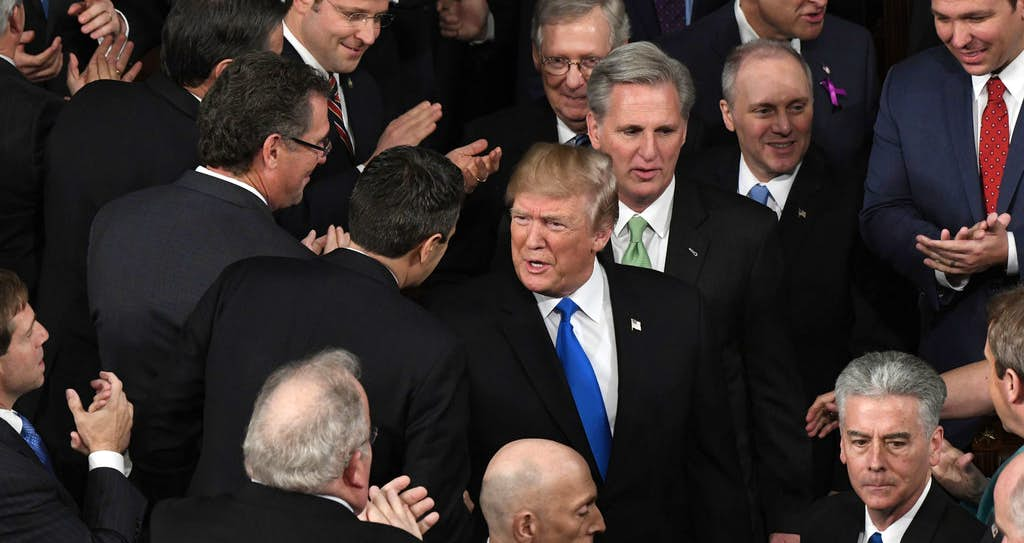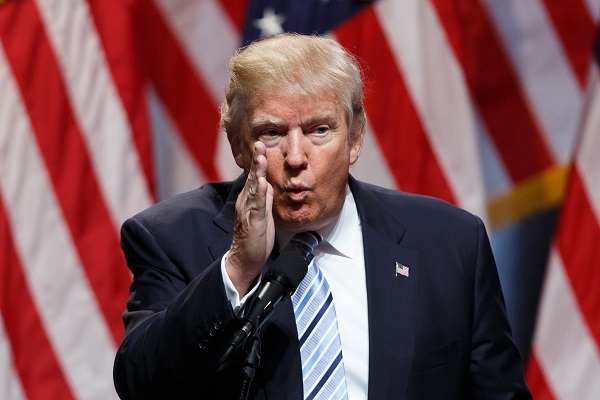
Donald Trump Pretends To Be as Gentle as a Lamb
(Poland) on 31 January 2018
by Jedrzej Bielecki (link to original)
Over the course of one year, a miracle has occurred in the United States. At least that’s what Donald Trump thinks. In January 2017, during his inaugural address, Trump talked about “American carnage” in a country led to the edge of the abyss by Barack Obama.
But in the State of the Union address, Trump announced that a “new American moment” has arrived, calling it “the best time to start living the American dream.” Then he asked for unity around this incredible vision of all Americans — regardless of “background, color, religion and creed.”
Given that the president is famous for his provocative tweets, one has to ask, where does such a sudden change in tone come from?
“It is very likely that Republicans will lose their leadership in Congress in the elections on Nov. 6, 2018. Then, the presidency of Donald Trump will become petrified. That’s why he wants to give up the usual strategy of confrontation which has alienated Americans,” said Willem Post, an America expert at the Dutch Institute of International Affairs Clingendael, in Rzeczpospolita.*
Trump’s approval ratings are actually disastrous. According to the Gallup Institute, only 38 percent of voters support Trump, and 58 percent do not trust him. These are the poorest ratings in America’s history. At this stage of the presidency, Obama had incomparably greater support (57 percent); nevertheless, Democrats lost their majority in Congress in the midterm election several months later.
Gallup’s analysis of many previous decades indicates that a party whose president had approval ratings below 50 percent lost 36 seats on average in the House of Representatives in elections two years after the inauguration of a new president. At the moment, Democrats need 24 seats to win back a majority in the house.
The Democrats have not taken the president’s offer of cooperation as a good sign. While Trump’s speech was interrupted by rounds of applause dozens of times from Republicans, the opposition remained silent.
Democratic congresswomen wore black to express solidarity with the “MeToo” movement, which is protesting sexual violence. Trump is accused of sexual misconduct by 19 women. What’s more, after it came to light that the president may have had an affair with porn star Stormy Daniels 10 years ago, his wife, Melania, arrived at the speech in Congress after traveling there alone without her husband.
A number of Democrats wore scarves bearing the colors of Ghana in protest of Trump’s earlier remarks referring to African countries as “shitholes.”
War with North Korea
Possibly the most concrete part of Trump’s compromise offer in his speech had to do with immigration. The president announced that he is ready to legalize the situation of 1.8 million people born in the United States to families of immigrants living in the U.S. without legal permission. However, in exchange, Trump said he wants the Democrats’ support for a “great wall” on the border with Mexico and tightened regulations regarding permission to immigrate to the U.S.
“I don’t see any possibility of working out a cross-party compromise in this situation. The topic is too sensitive, both sides have taken a radical approach,” claimed America expert Post.*
Even if such an agreement on immigration policy were reached, Trump has introduced many other initiatives which have been rejected by Democrats. In particular, Trump announced that he was annulling Obama’s 2009 decision to close the prison camp at Guantanamo Bay (a decision which was then delayed by Congress many times). Some 41 detainees remain at Guantanamo Bay to this day.
Trump has also announced that he will accelerate an armament program, especially with respect to nuclear weapons. However, the most significant announcement was the billionaire’s suggestion that Washington may undertake a military operation against North Korea this year.
“North Korea's reckless pursuit of nuclear missiles could very soon threaten our homeland. Past experience has taught us that complacency and concessions only invite aggression and provocation. I will not repeat the mistakes of past administrations that got us into this very dangerous position,” Trump said.
Meanwhile, the president did not mention the investigation led by Special Counsel Robert Mueller into connections between his election campaign and Russian officials. In Washington, rumor has it that the president might dismiss Mueller, just as he dismissed former FBI Director James Comey last May. Democrats are convinced that if Russian hackers had not disclosed Hillary Clinton’s emails, the election result would have been different.
“After a long and divisive year, many Americans yearned for the president to present a unifying vision for the country. Unfortunately, his address tonight stoked the fires of division instead of bringing us closer together,” said Senate Minority Leader Chuck Schumer.
It Was Obama Who Reduced Unemployment
America’s economic situation is currently excellent; Wall Street keeps breaking records.** In the State of the Union address, Trump claimed that his policies are responsible for this success. However, this thesis has been undermined by the American media, who verified certain facts. It is true that unemployment has not been as low (4.1 percent) in 17 years, but that is mainly due to the fact that there was a decrease in the number of people seeking jobs during the last six years of Obama’s presidency. Since Trump took office, 1.8 million jobs were created, but this is actually the slowest rate of decrease in unemployment since 2010.
The president’s argument that he managed to implement the biggest tax reduction in history also cannot be sustained. The cuts represent 0.9 percent of the gross domestic product and are smaller than the previous seven similar reductions. Ronald Reagan reduced taxes by the equivalent of 2.9 percent of the gross domestic product in 1981.
Changes in commercial policy are also more modest than those that were announced. It comes down to withdrawing the U.S. from the Trans-Pacific Partnership, because America has apparently remained a member of NAFTA.
The biggest issue, though, is that only the richest are benefitting from the booming economy. Trump’s poorer voters from the Midwest are affected by it to a lesser degree.
*Editor’s note: Although accurately translated, the source of this quoted remark could not be independently verified.
**Editor’s note: This passage reflects the U.S. economic situation at the time the article was written on Jan. 31, 2018.

